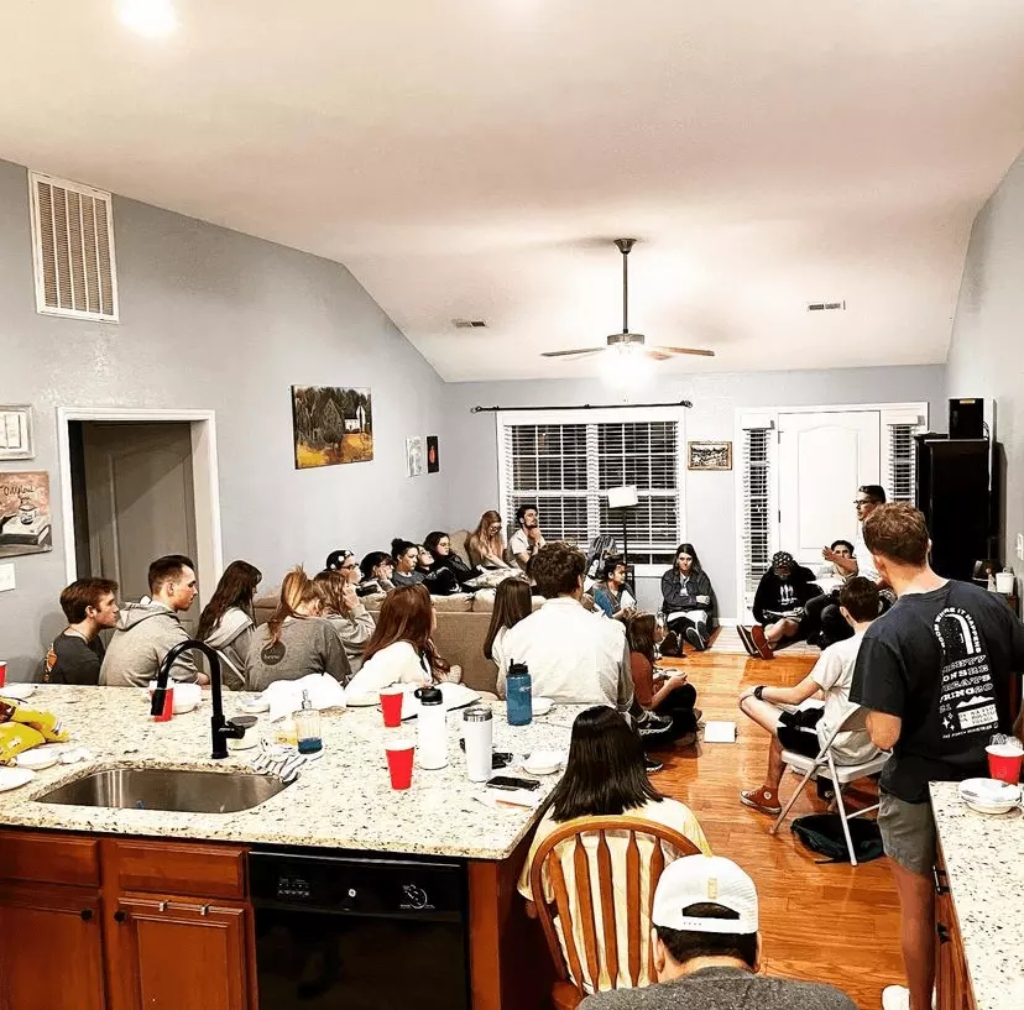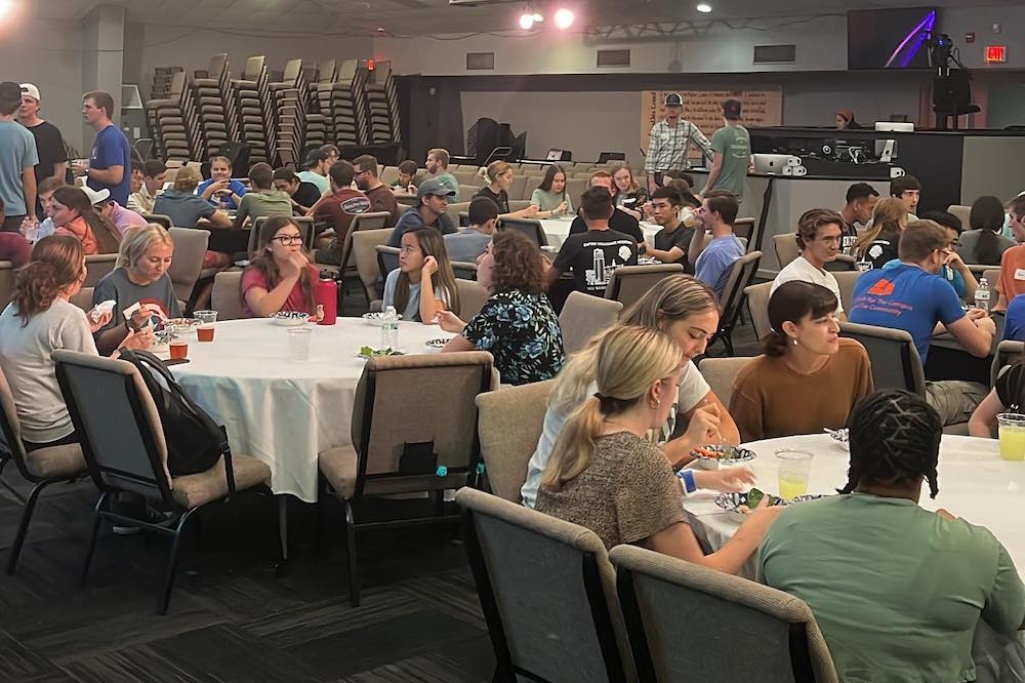
Students in the college ministry of Chilhowee Hills Baptist Church in Knoxville gather in the home of Matt and Dana Paradis for Bible study.
Early next month, Eddie Gilley will lead a group of 42 students from the University of Florida’s (UF) Baptist Collegiate Ministries (BCM) on a leadership retreat in anticipation of the fall semester. Four days and three nights at Cocoa Beach will include fun in the surf, but also plenty of discipleship.
The goal is to lead students toward a fellowship that echoes John 13:35 and spills into serving not only those on the UF campus but the local church.
“Our stated aim is for them to know each other when we come back to campus,” Gilley said. “We intentionally have time for them to hang out … and in the afternoon we have our sessions.” Those can cover training in small group leadership, evangelism, praise team and worship planning, among other topics.
As parents get ready for the emotional dorm drop-off, churches and on-campus collegiate ministries prepare to welcome students back. It’s a time for new beginnings and, leaders say, the opportunity to begin sowing the next generation of church leaders.
Success in any ministry requires consistency, though. That begins early.
“The first two to three weeks are important,” said Arliss Dickerson, who served 32 years as BCM director at Arkansas State University before two years as college minister at First Baptist Church in Jonesboro, Ark. “Whatever they do will likely have an effect because after that, they’re going to start being busy.”
And what doesn’t become part of their life will struggle to find a foothold.
“If they don’t do things related to their faith, that will likely get squeezed out, even if they don’t mean for it to,” he said.
Gilley, in his 21st year at UF, worked with college students at West Side Baptist Church in Gainesville from 1987-95, when he accepted the BCM position at Florida.
“It’s a critical moment in life,” he said. “There are so many decisions you make in college that set up how you’re going to do as an adult. It’s not just about getting a degree, but getting outside of your parents’ direct influence and developing your own thoughts about who you are.”
College ministries guide students through those times. On a secular campus where liberal ideology pervades, Christian students get support at a ministry such as BCM.
That connects with Gilley’s second major avenue in his ministry.
“We want to tie those students to Southern Baptist churches,” he said. “Sometimes, it feels like we have abandoned college ministry due to finances or other reasons. I get it; state conventions have to make decisions. But for me, I’ve invested my life on the college campus. So, I think it’s the most strategic place where you can invest.”

Students worship at Gator, the University of Florida BCM’s weekly gathering.
Dickerson, who was formerly also Leadership Development consultant for collegiate ministries when it was conducted through Lifeway, has written books on the subject and routinely posts at his personal blog, College Ministry Thoughts.
“As different state conventions address their budget issues, I think we have to be strategic in our cuts,” he said. “In letting BCM campus ministers go, it usually starts with the most experienced ones who are training and raising up others because their salary is larger.
“Collegiate ministry is a future investment. Where will our missionaries, pastors and other church leaders come from in 5-10 years? I fear we make cuts in collegiate ministry because it’s least felt today.”
On-campus ministries have an advantage to church-based collegiate ministries in attracting students. College comes to an end at some point for everyone, though. The goal for those ministries is to connect students with a local church where they can become active members into adulthood, a point made by Gilley and Dickerson.
The college ministry at Chilhowee Hills Baptist Church in Knoxville, Tenn., models this. Each week, students from the University of Tennessee, Carson-Newman University, Johnson University and Pellissippi State Community College crowd into the home of Matt and Dana Paradis for Bible study.
Matt Paradis, who is associate pastor of college and missions at Chilhowee, said the secret of attracting college students is … well, not really a secret at all.
“They want deep relationships and we offer a family setting. Our house is always open for them,” he said.
At any time, students can be at the Paradis home doing laundry, eating a meal or petting Hank, their Aussie doodle.
“My wife and I consider ourselves rather boring,” he said. “We’re not program-driven. We have Sunday School and regular Bible study. We depend on our students to grow our ministry.”
The church’s ministry works alongside local BCMs in evangelism and other outreach efforts. Paradis, an occasional BCM speaker, and Chilhowee also partner with them on mission trips.
Bible studies at their home run deep.
“I’m not great with being topical, so we do book studies, dive through Baptist catechisms; we’re going through some pretty meaningful stuff,” Paradis said. “I’ve noticed that this group isn’t interested in what is big and flashy. They want depth more than anything.”
Churches looking to start or build their collegiate ministry have at least two national Southern Baptist-connected resources. SBCCalled.com was developed by Steve Masters, longtime director for the BCM at Louisiana State University. Another is CollegeMinistry.com.
In reaching students, it’s also important to get them involved, Gilley said. “Find ways to help them promote what the church is doing. Meet with them for lunch. Let them have committee roles.”
While this is a connected generation, he added, there are other connections to build.
“They’re growing up and [are] going to make mistakes,” Gilley said. “But we’re close enough to help them.”
(EDITOR’S NOTE – Scott Barkley is national correspondent for Baptist Press.)


